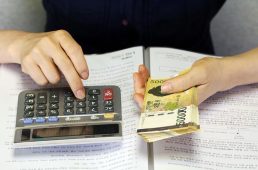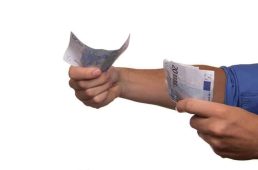Financial freedom isn’t about how much we earn – it’s about how we manage our money.
Understanding our true desires, leveraging market forces wisely, and letting our money work for us are the keys to change – and that change is entirely in our hands.
A Personal Confession
It’s been years since I stopped talking about my dreams.
“Who has time to dream?” I’d say.
I don’t like talking about money, I admit. Each month feels like a new battle for survival – Working myself to exhaustion, and yet, for some inexplicable reason,
Living from one paycheck to the next. Most of the time, I suppress it.
But when the credit card statement arrives – it’s just me… and the numbers.
What Is Financial Freedom, Really?
We often hear about financial freedom in the context of early retirement by age 30.
But before you picture yourself sipping cocktails on a beach in Koh Phi Phi, let me clarify – this article isn’t about early retirement. Personally, I don’t believe that’s a sustainable goal (Spoiler: even endless beach days lose their charm eventually).
Instead, let’s talk about financial freedom in terms of living debt-free, maximizing what we have, reducing dependency on money, and ultimately making money work for us – not the other way around.
According to Israel’s Central Bureau of Statistics (CBS), many of Israeli households were in overdraft at least one month per year. Often, the reason is simple: many families avoid financial discussions due to discomfort or fear, leading to a lack of control and peace of mind.
So, What Is Financial Freedom?
It goes far beyond money. It’s about peace of mind –
Being calm when your boss calls you in unexpectedly.
Being able to choose who you work with.
Affording an extra extracurricular activity for your child.
Extending your maternity leave.
Enjoying a weekly date night or spontaneously booking a weekend getaway.
Financial freedom means making decisions that aren’t dictated solely by money. It looks different for everyone, but if we had to define it in one sentence:
It’s the ability to make choices without being financially constrained.
Financial Minimalism: A New Approach to Spending
Achieving financial independence involves two sides: income and expenses.
While many articles focus on how to increase income, this one shifts the focus to expenses – the side many people neglect.
Financial minimalism is about changing your mindset and gaining a deeper understanding of your needs and desires so that you can make the most of the money you already have.
Adopting this mindset helped me reach true financial freedom with just a few simple steps – and you don’t need to be a finance expert to do the same. Here are eight key principles:
- Eliminate Debt
Debt is bad – period.
(Except for strategic debt, like a mortgage or leverage for investment.)
Living in debt means constant stress and stagnation – financially and emotionally. Worse, compound interest can drag you deeper into the red.
Debt prevents you from taking risks, making smart choices, pursuing goals, or simply enjoying life. Get rid of it as a priority.
- Spend Less Than You Earn
Are you living within your means?
Most people spend more as they earn more – it’s a well-documented phenomenon.
In the past, whenever I got a raise or managed to save a little extra, my first thought was: “How can I spend this?”
A new car. A better phone. A home upgrade.
The truth is, the best way to give yourself a raise is to spend less.
To achieve financial freedom, maintain your lifestyle even when your income rises.
Save the extra. Ideally, aim to save 15–20% of your income.
- Reevaluate Your Desires
Why deny ourselves, you ask? If we’re earning more, why not upgrade?
The point isn’t denial – it’s clarity.
We live in a world that takes abundance for granted, tires of it quickly, and promotes the belief that material goods equal happiness.
But often, we spend money on things we don’t need and that don’t bring real joy.
Before every purchase, ask yourself:
- Do I truly need this?
- Will it bring me lasting value or happiness?
You’ll be surprised how quickly your expenses shrink.
- Track Every Expense
Yes, every single one – from rent and fuel to coffee and snacks.
Break your spending into categories: food, housing, clothing, entertainment, etc.
Tracking expenses creates awareness and control.
By month’s end, you’ll hold yourself accountable – and start thinking twice before spending.
There are many great budgeting apps out there.
- Dig Deeper
As people begin tracking expenses, many discover shocking truths –
They had no idea how much they were spending on food or gas.
Worse, they find they’re still paying for duplicate services or unused subscriptions.
Gather all the data. Check for charges you didn’t authorize.
Review each spending category and ask yourself:
- Is this giving me real value?
If yes, call your provider and negotiate. You’d be amazed how much you can save with just a few calls.
- S-A-V-E
Who is truly wealthy? The one who saves before it becomes necessary.
Once you’re debt-free and have begun saving, start an emergency fund.
Set aside the equivalent of six months’ worth of expenses.
Life happens – and we need to be prepared.
Keep the fund in a separate account to avoid temptation.
Once that’s in place, you can finally start enjoying the power of interest.
- Harness the Power of Compound Interest
“Compound interest is the eighth wonder of the world,” said Einstein.
“He who understands it, earns it. He who doesn’t, pays it.”
Unlike with debt, compound interest here works for you.
Cash sitting in a checking account loses value due to inflation.
If I could tell my 20-year-old self one thing:
Start investing, even if it’s just 200 shekels a month.
Don’t let your money stand still.
- Don’t Sacrifice Your Joy
After all the budgeting and reducing, this point is crucial –
Don’t deprive yourself of happiness.
Being financially responsible doesn’t mean you must give up the present or avoid life’s pleasures.
Instead, it’s about intentional living – setting healthy priorities and tuning out unnecessary noise.
About the Author
Lital Shimoni Slivka is an economist, consumer researcher, and author of the blog “Another Kind of Consumerism” which promotes awareness and dialogue around financial minimalism and mindful spending.



